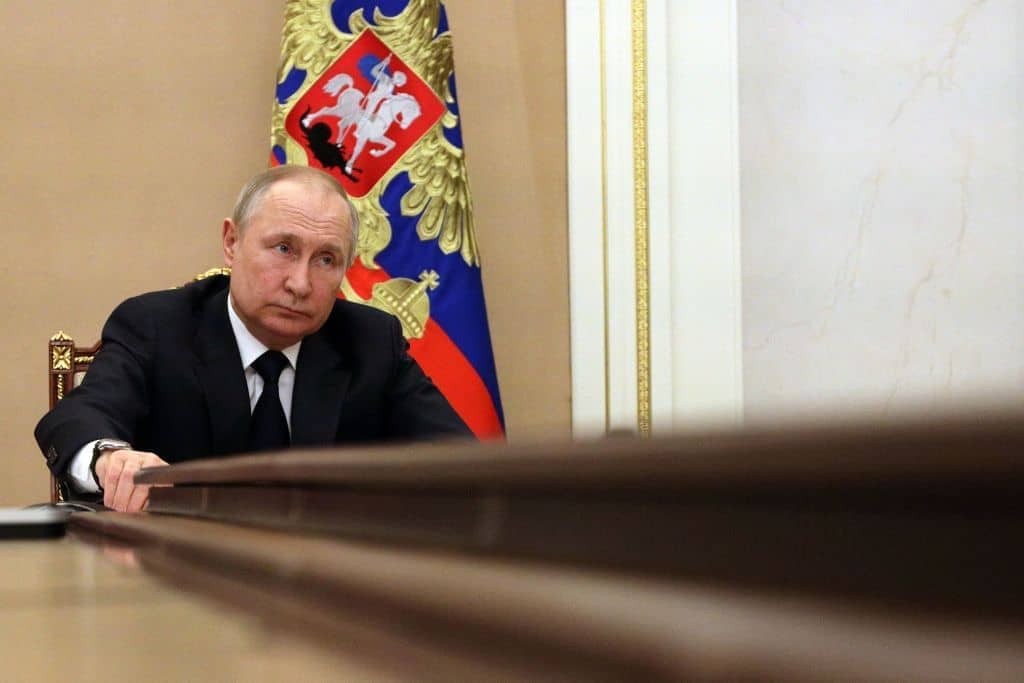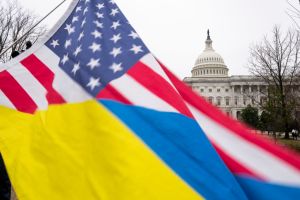Russia has signaled that, a month into a war that it expected to take a few days, it would begin scaling back its military activities around the Ukrainian capital Kyiv. Moscow’s deputy defense minister, Alexander Fomin, said that the move was designed to increase mutual trust between Russia and Ukraine.
The real reason, if indeed the claim proves to have any veracity, is more likely that Vladimir Putin’s military has taken a pounding around Kyiv, leaving village high streets strewn with burned-out Russian tanks and dead soldiers.
Fomin said that Russia “would dramatically reduce military activities in the directions of Kyiv and Chernihiv.” Chernihiv is one of several major cities under siege by their forces. The announcement follows a declaration last week that Moscow was now entering “a new phase” of the war in which it would concentrate its efforts on the Donbas.
Any such move is almost certain to include a continued attempt to overrun Mariupol, the 440,000-strong southern city that has been the scene of some of the heaviest fighting and civilian casualties of the war. That would allow the Russians to hold a land corridor to Crimea, a key military objective.
The announcement by the Russian military that it was giving up attempts to seize Kyiv, at least for now, came amid reports that it was preparing to withdraw exhausted forces back into Belarus to regroup.
In what was expected to be a one-round fight Ukraine has so far punched far above its weight. Moscow’s forces, meanwhile, high on Kremlin-fueled hubris and following a disastrous battle plan, have taken up to 20,000 casualties, their supply lines ravaged by Ukrainian fighters using guerrilla tactics and first world weaponry.
The first month of the war has also laid bare one of the gaping weaknesses at the heart of Putin’s czardom: that for months, probably years, he has been surrounded by sycophants only too willing to reinforce his theories and narratives.
During World War Two, both Hitler and Stalin were reputedly miserable military leaders. But whereas Stalin eventually accepted his martial frailty and allowed his generals to take over war-waging, Hitler never stopped interfering in the Wehrmacht’s plans.
What happens next in Ukraine may tell us whether Putin — seemingly also susceptible to delusion — is a wartime Hitler or Stalin. The logical military path forward for Russian generals would seem to be to dig in or regroup in the West and concentrate their flow of men and materiel against one large eastern Ukrainian city at a time.
If the Russian military follows that script it could be a sign that rational Putin — after taking a short leave of absence in the run up to the invasion — is once again back in the driving seat. It is, however, perfectly possible, that far from admitting to a serious error of judgment grandiosity will get the better of the Russian leader and he will, after a brief pause to resupply and rearm his forces, lunge again at Kyiv.
Western analysts said yesterday that Russians have made no serious movement to withdraw yet. They also questioned their motives. “Does ‘we’ll drastically reduce military operations around Kyiv’ mean ‘we’re getting our ass kicked, transitioned to a hasty defense’?” Mark Hertling, a retired US lieutenant general and former commander of US Forces in Europe, tweeted.
Shortly before the attack on February 24, Moscow also claimed that it was withdrawing and showed footage of tanks rolling eastwards from Crimea. The announcement that Russia is to move its large pieces around the chessboard came after a day of peace talks in Istanbul. Fomin said that the military decisions were being made in the light of “negotiations over the preparation of an agreement on Ukraine’s neutrality and non-nuclear status.”
While the talks may appear to offer early signs of a breakthrough it is far too early for optimism. For one, all of Ukraine’s major concessions would be put to a referendum that would, in the best case, take many months to arrange.
Furthermore it is difficult to see how Putin will drop his messianic view of uniting the three ancient Russian lands, in exchange for twilight years spent ruling a country largely cut off from the rest of the world and living on a war economy.
Russia has a long history of announcing ceasefires, humanitarian corridors and the like which offer hope and subsequently reneging on them. A pause in the conflict could benefit both sides. The Russians badly need a chance to move their forces around in preparation for what comes next.
Ukraine, whose battlefield losses have been far more difficult to estimate but have probably been significant, may simply want to come up for air ahead of what still looks set to be a long bloody war of attrition.
Putin, a man not short of self-worth, may find the very thought of sitting down with Zelensky, a man he has called the leader of a gang of drug addicts, too much to ask. He has, after all, kept even his closest advisors many arms’ lengths away.
A meeting between the two presidents to discuss the Donbas is one of Ukraine’s key demands. But Vladimir Medinsky, Russia’s lead negotiator, said such a meeting would only happen when foreign ministers were ready to initial a peace agreement. In order for that to happen “we still have a long way to go,” he said last night.
This article was originally published on The Spectator’s UK website.


















